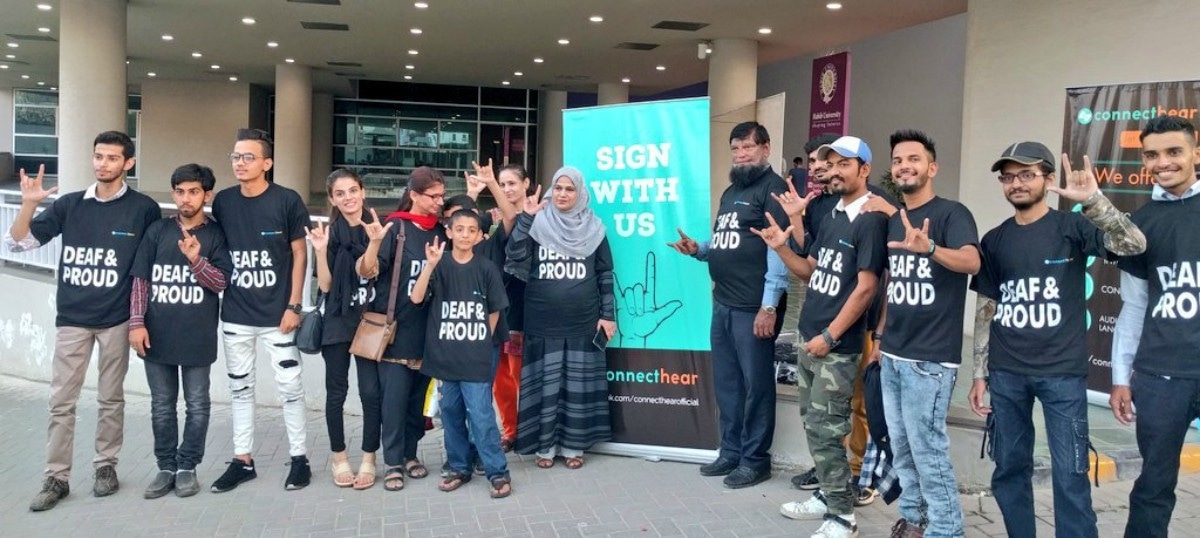Around 300 Deaf people got to enjoy a Strings concert
Last night's Strings concert at Habib University has surprisingly been making waves for reasons that have little to do with the popular band.
While the band is celebrating 30 years to Strings with their album 30, the concert had the distinction of being Pakistan's first concert that was inclusive of those who are hard of hearing.
Organised by Habib University and startup ConnectHear, the concert was attended by roughly 300 Deaf people.
Here's how their inclusion was possible
ConnectHear is a startup company, incubated at The Nest i/o and has been working to bridge the communication gap between people who are Deaf and society at large since last June.
In conversation with Images, CEO and Co-founder of ConnectHear Azima Dhanjee explained that the startup offers a variety of facilities, "We provide sign language interpretation services, both in person (for corporations and events) and video-based. We also have an online channel where we post content with a sign language interpreter hosting the video. The content is not just about the Deaf but everything happening in the world."
Azima also let us know that 'Deaf' is the appropriate term and has more positive connotations that terms such as 'hearing impaired' which imply a deficit within a person. “Deaf is the term that the community worldwide identifies themselves as,” she explained. I don't know about you but this is some important information.
She is one of the three co-founders of ConnectHear, along with CSO Areej al Medinah and CTO Arhum Ishtiaq. Together with their lead sign language interpreter and trainer Muhammad Osama, they find new ways to train people in sign language.
"We're working on a software that'll convert any audio into sign language," said Azima.

Having interpreters at concerts is slowly becoming a norm in the US and the ConnectHear team was very eager to make the first Deaf inclusive concert happen in Pakistan.
According to Azima, "We try to make as many events inclusive for Deaf people as possible. An old friend at Habib University was hosting a concert for the university and he asked us if we would like to interpret the concert. We've been wanting to do something like this for a very long time. So we collaborated with Habib University and Strings for this project."
With Habib University and Magnus as their sponsors for the event, the team had four interpreters work with Strings for the concert. "We worked on the lyrics and also arranged the music in a way to make sure the audience could feel the bass so that they could enjoy the concert," added Azima.
The concert was a definite success, with 300 Deaf folks joining the audience and enjoying Strings the way we know they should. The show also had Deaf models from Amir Adnan's ramp walk opening the show with the national anthem.
The startup used the tagline of "Deaf and Proud" for the night and they made their point wonderfully.
"We talked to people later and it felt great to hear them say they couldn't tell who was differently abled and who wasn't. The interpreter was on the same stage as the musicians and everyone was enjoying the concert the same way."
So how can the Deaf enjoy a concert?
"If there is a song, we communicate the lyrics through sign language. So there is wording interpretation of course, but along with that, we communicate the music as well. The guitar, beats and more are made adaptable by the sound system. The vibrations of the sounds let a person know the music. The mood of the song is communicated via lighting. These three components work together to allow a Deaf person to enjoy a concert."
She added, "No one felt excluded and this is what ConnectHear is for, inclusion at the maximum level. There were people in their forties and fifties who claimed this to be the first time they took part in anything of the sort. It really opened our eyes to how even though concerts are always happening, there are so many limitations due to which many people are deprived of enjoyment. We don't want anyone thinking a certain space is not for them."
Asking Strings about the event, the band responded saying, "It was a very special moment for us. It was beautiful watching our special guests dancing with the students to our music and we're so humbled by the experience. We hope they enjoyed as much as we did!"
Any move for inclusivity in Pakistan is a welcome one. ConnectHear proves that even in a country like Pakistan where music performances are hard to pull off, a little extra effort made it possible for a greater number of people to enjoy it.
Shout-out to Strings for taking on this idea and making it a success.












Comments